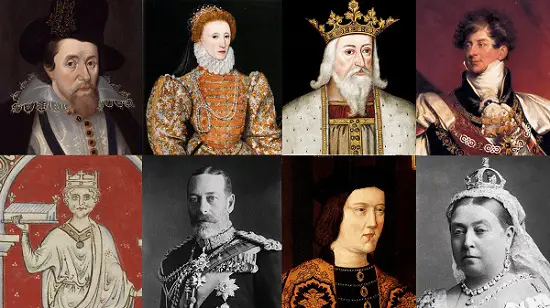| Today, in the early 21st century, |
| most countries no longer have kings and queens. |
| However, some countries have remained as monarchies, |
| including England and its former colonies. |
| However, even in these countries, |
| the monarch is a ceremonial figure who no longer has any real power over his or her subjects. |
| These countries are called constitutional monarchies |
| because they are democracies in which the monarch remains the official head of state. |
| Many years ago, the kings and queens of England did have real power, |
| but gradually this power was transferred to the people and their elected officials. |
| It is interesting to examine how this transition occurred. |
| Even in very early times, |
| the king of England did not have absolute power. |
| He was the most powerful man in the country, |
| but he could not entirely force his will upon others. |
| If he became too demanding, |
| he might face opposition from powerful local land-owners. |
| These men, called the barons, might resist a king who tried to become too strong. |
| This is exactly what happened in the year 1215. |
| The king of England had made many unreasonable demands upon the country, |
| and the barons decided to resist. |
| They forced the king to agree to a list of rules that would limit his power. |
| These rules were written in a famous document called the Magna Carta. |
| This document described not only the rights of the barons, |
| but also of the common people of England. |
| During the next few hundred years, the kings still had much power. |
| However, some other people, such as the landowners |
| and the richer men of the towns, also had influence. |
| Their meetings became known as Parliaments, |
| and the king had to share power with the parliament. |
| During the 1640s, one king tried to rule without Parliament, |
| and tried to take away the rights of Parliament. |
| This led to a civil war, and the king was defeated. |
| England soon became a monarchy again, |
| but it became clear that Parliament would have more power than the king. |
| Until the twentieth century, |
| the Parliaments of England became more democratic, |
| as more and more people were allowed to vote. |
| Today, England still has a constitutional monarchy. |
| But not all English-speaking countries recognize the English queen. |
| For example, the United States became an independent country over 200 years ago |
| and has become a republic ever since. |
| In some countries, there is the debate about the future of the monarchy. |
| Canada, Australia, and New Zealand still recognize the queen of England as their own queen |
| even though those countries are no longer governed by England. |
| Many people in those countries want to abolish the monarchy. |
| They believe that their countries should now have their own head of state. |
| On the other hand, some people in those countries |
| want to keep the monarchy because it reminds them of their country’s early history. |
| This is an ongoing topic of debate for Canadians, Australians, and New Zealanders. |
More English listening lessons for intermediate level:
Lesson 51: Canada Provinces and Territories





